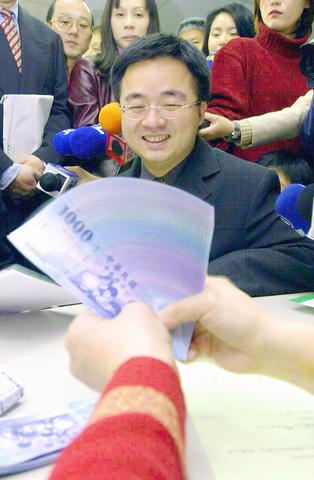The ruling DPP yesterday closed its registration for prospective legislative candidates. It aims to nominate 80 candidates out of 146 registered hopefuls for the year-end legislative election.
A total of 117 legislative candidates, including 31 nominees registered for legislators at large (
DPP Chairman Frank Hsieh (

PHOTO: CHIANG YING-YING, TAIPEI TIMES
"But there should be no problem for the DPP to hold onto its current 67 seats," Chen added.
Endorsing Chen's views, Chin Heng-wei (
"Anyone who wants to run [for public office] is inevitably supported by certain factions within the party. This does not help the party to increase its votes," Chin said. He therefore added that it would be a tough fight if the DPP were to win half of the 225 legislative seats.
Lee Yong-ping (李永萍), a former DPP member but now director of the People First Party's (PFP) legislative caucus, said that the DPP's prospective candidates were competitive since former members of the National Assembly, such as Liu I-te (劉一德), and incumbent government officials, including Lo Wen-chia (羅文嘉) and Hsiao Bikhim (蕭美琴) would all participate in the election. Most of them have the advantage of enjoying high popularity.
She suggested, however, that the election would be a strategically tricky one for DPP candidates.
"To avoid being connected with the DPP government's failures, candidates will have to show a degree of independence from the party. But at the same time, they will need to ally themselves with the party in order to take advantage of its resources," Lee said.
Lee said she believed that the candidates to be fielded by the DPP had good social images and were well-qualified to be members of the legislature. Still, she was not worried that the DPP would outshine the PFP in terms of election performance since "supporters of the DPP and the PFP rarely overlap."
Meanwhile, the DPP's survey center yesterday completed its public polls for candidates for Tainan and Kaohsiung county commissioners. The poll score accounts for 70 percent of candidates' primary scores.
A total of 28 candidates had previously registered to run for the commissioner and mayoral elections in 14 counties and cities.

Intelligence agents have recorded 510,000 instances of “controversial information” being spread online by the Chinese Communist Party (CCP) so far this year, the National Security Bureau (NSB) said in a report yesterday, as it warned of artificial intelligence (AI) being employed to generate destabilizing misinformation. The bureau submitted a written report to the Legislative Yuan in preparation for National Security Bureau Director-General Tsai Ming-yen’s (蔡明彥) appearance before the Foreign Affairs and National Defense Committee today. The CCP has been using cognitive warfare to divide Taiwanese society by commenting on controversial issues such as Taiwan Semiconductor Manufacturing Co’s (TSMC, 台積電) investments in the

INVESTIGATION: The case is the latest instance of a DPP figure being implicated in an espionage network accused of allegedly leaking information to Chinese intelligence Democratic Progressive Party (DPP) member Ho Jen-chieh (何仁傑) was detained and held incommunicado yesterday on suspicion of spying for China during his tenure as assistant to then-minister of foreign affairs Joseph Wu (吳釗燮). The Taipei District Prosecutors’ Office said Ho was implicated during its investigation into alleged spying activities by former Presidential Office consultant Wu Shang-yu (吳尚雨). Prosecutors said there is reason to believe Ho breached the National Security Act (國家安全法) by leaking classified Ministry of Foreign Affairs information to Chinese intelligence. Following interrogation, prosecutors petitioned the Taipei District Court to detain Ho, citing concerns over potential collusion or tampering of evidence. The

‘COMPREHENSIVE PLAN’: Lin Chia-lung said that the government was ready to talk about a variety of issues, including investment in and purchases from the US The National Stabilization Fund (NSF) yesterday announced that it would step in to staunch stock market losses for the ninth time in the nation’s history. An NSF board meeting, originally scheduled for Monday next week, was moved to yesterday after stocks plummeted in the wake of US President Donald Trump’s announcement of 32 percent tariffs on Taiwan on Wednesday last week. Board members voted to support the stock market with the NT$500 billion (US$15.15 billion) fund, with injections of funds to begin as soon as today. The NSF in 2000 injected NT$120 billion to stabilize stocks, the most ever. The lowest amount it

NEGOTIATIONS: Taiwan has good relations with Washington and the outlook for the negotiations looks promising, Minister of Economic Affairs J.W. Kuo said Taiwan’s GDP growth this year is expected to decrease by 0.43 to 1.61 percentage points due to the effects of US tariffs, National Development Council (NDC) Minister Paul Liu (劉鏡清) said at a meeting of the legislature’s Economics Committee in Taipei yesterday, citing a preliminary estimate by a private research institution. Taiwan’s economy would be significantly affected by the 32 percent “reciprocal” tariffs slapped by the US, which took effect yesterday, Liu said, adding that GDP growth could fall below 3 percent and potentially even dip below 2 percent to 1.53 percent this year. The council has commissioned another institution